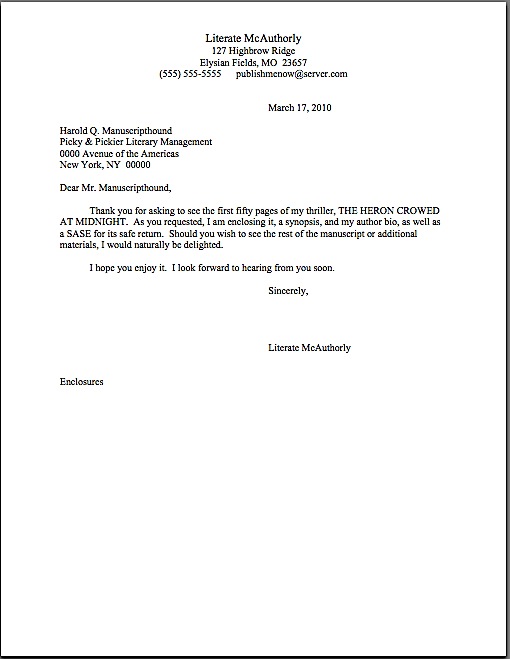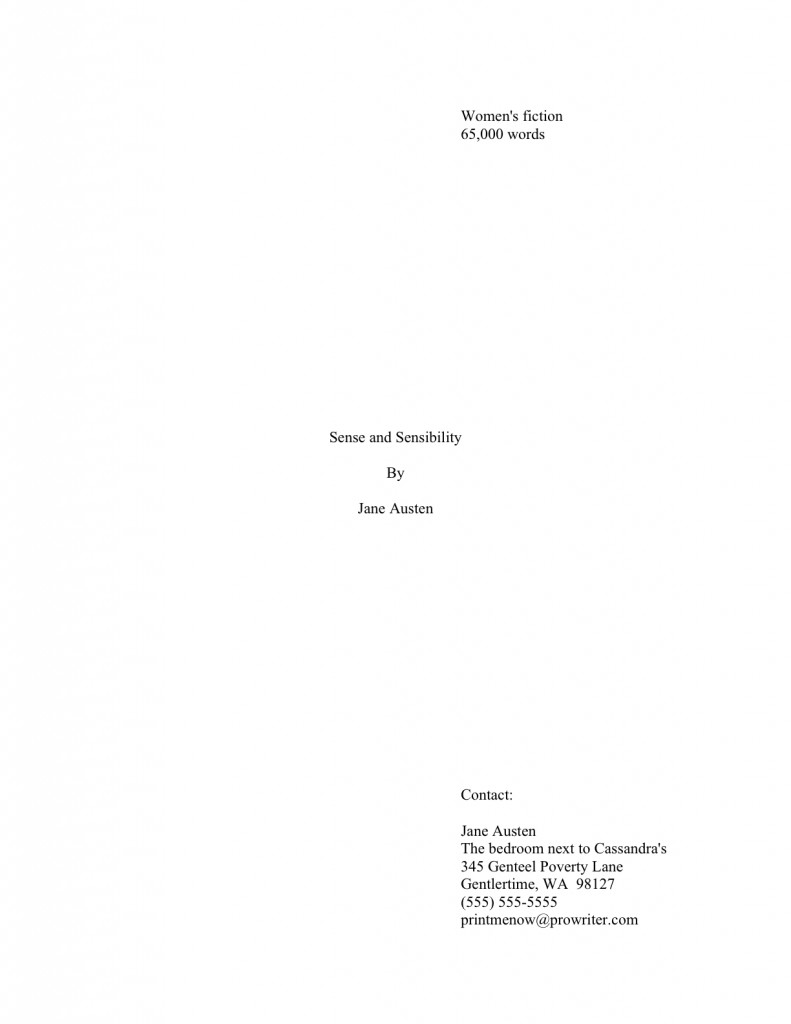I had to laugh, campers: remember Tuesday’s lengthy post on cover letters for submissions, and, by extension, on the many, many benefits of tailoring one’s communications with agents, editors, and the rest of us that read for a living in such a way that (a) one demonstrates a laudable ability to communicate clearly in writing, (b) one displays an admirable willingness to follow the directions given in the request for pages, and (c) one practices a level of courtesy that indicates not only that one would be a pleasure to work with, but also that one does not expect the manuscript-requester either to have been holding her breath, awaiting your submission, or to drop all of her other work to pay attention to your pages the instant they arrive? You know, the post in which I explained with meticulous care that since so many aspiring writers are inconsiderate in their submissions, it would be very much in your interest to be the one submitter that day that greets Millicent the agency screener with professional politeness? To be, in fact, the one aspiring writer out of a thousand that puts in the effort and thought to render herself easy to help?
Once again, as so often occurs, the universe rushed to provide me with further examples to illustrate a discussion already in progress here at Author! Author! Yesterday, I found myself devoting hours to an author that expected me to abandon any work-related plans I might have had for my afternoon to pay attention to an essay he had written — as a potential guest post here, as it happens — without any prior warning. That in itself is too common to be irritating; it frequently takes writers years to accept that their deadlines are not the only ones with which the pros deal. The fact that he had pulled the same stunt on Monday, while less ordinary, had already confirmed him in my mind as someone that would not be especially easy to help.
Being an easy-going sort of person, however (or at least as easy-going as it is possible to be in a deadline-based business), my first response to his popping up again — and so soon, too — was not to dismiss him as inconsiderate or unprofessional. I intended merely to give him a gentle hint that the next time he wanted my advice, he should plan on asking, nicely, to book my time a week in advance.
That was my plan, anyway, until it became clear that he was outraged about Monday’s editorial feedback. You know, the stuff I’d spent an hour thoughtfully compiling for him on a moment’s notice.
Which, again, is not in itself unusual enough to raise my delicate eyebrows much. What did throw me a little — and make me think of our ongoing series — was that the tirade the author saw fit to e-mail me was clearly his immediate response to my editorial suggestions. That indeed surprised me: by the time most writers make their way into print, they have generally learned that their first responses to revision requests do not always match up with their subsequent thoughts on the subject. An experienced author might still compose that irate e-mail telling the editor that she must be out of her ever-loving mind, but he usually has the presence of mind not to hit SEND.
Why bring this up in the midst of a discussion on submission, you ask, other than to plant the seed in your mind that a prudent writer will wait a few days before taking issue with an agent or editor’s revision request? Two reasons: to illustrate my earlier point that how writers present themselves sometimes discourages the pros from trying to help them — and to remind everyone that the manuscript is not necessarily the only part of the submission that an agent, editor, or Millicent will weigh in deciding whether to represent a writer. The writing is the most important element, of course, but the professionalism of a submission packet and submission behavior that demonstrates both courtesy and a willingness to follow directions will also go a long way toward convincing a pro that yours is the project out of tens of thousands to select.
Perhaps equally important for first-time submitters to know, this is a business in which politeness counts, as do reputations. Although it may appear huge and monolithic to a writer trying to break in, U.S. publishing is actually a relatively small and diverse world. People talk.
Why might a writer want to be concerned about what they say? Well, let me put it this way: I already knew when the soon-to-be irate author approached me with a request to guest-blog that he tended to overreact to editorial feedback. I’d heard stories.
To be fair, such stories abound. One does not have to hang around publishing circles very long to learn that as a group, writers have a reputation for being hypersensitive to feedback, if not downright resistant to it. We also, I’m sorry to report, have gained the image of reacting with equally violent negativity to any suggested revision, be it a request to alter a single paragraph in Chapter 2 or to rework the entire last third of the book.
“What do you mean, I have to add a comma on line 3 of page 147?” the faceless author of professional anecdote rails. “That would utterly destroy my artistic vision! And you want me to stop using adverbs to modify every appearance of the word said? Madness!”
Like most stereotypes, the writer that flies into an insensate rage over the slightest criticism is largely mythical, of course, and his ubiquity is certainly exaggerated. In my experience, most writers serious about their craft do try pretty hard to be open to professional critique. And that can be genuinely challenging, as almost every aspiring writer thinks of her first manuscript, at least, as part of herself.
So when even the best-intentioned agent or editor says something as self-evidently helpful as, “You know, your target audience might respond better to this character if he didn’t swear in every sentence,” it’s not entirely surprising that a writer new to revision might hear not a practical suggestion to excise a few dozen specific words over the course of a manuscript with a hundred thousand of them, but a blanket condemnation of her writing style.
It’s even less astonishing than such a misinterpretation would have been fifty or sixty years ago. Most aspiring writers today are not aware of it, but the submission system used to be set up, at least in part, to inure them to the fact that one of the ways the pros help writers is by offering feedback. How so? Well, in the bad old days, a writer would send a manuscript (often, unwisely, his only copy) to a publishing house, and he would receive a response from some kind editorial assistant. Most often, that missive would be a form letter, thanking the writer for his submission but informing him that it did not meet the publisher’s needs at that time.
If the manuscript demonstrated even the slightest hint of what at the time was called promise, however, that editorial assistant — or even an editor — might well fill that letter with feedback and professional advice. And not only in the instances in which the editor felt the manuscript had sufficient publishing potential that the letter included a request to revise and resubmit: astonishingly often, the pros would take the time to say encouraging words to those only beginning to tread the path to writing professionally.
That meant, if a writer kept at it, she would see a definite progression in submission response. At first, she might receive only generic form letters, but if she worked on her craft and presentation, the next time around, the rejection might take the form of a nice note. After that, she might receive a few general editorial suggestions to improve her work. If she took those seriously, her next effort might spark a letter with detailed feedback, along with a request to resubmit the manuscript after those changes were made. And then, if she was hard-working, talented, and lucky enough to have written something that might appeal to the current market, an editor might well have acquired the book, even if it still needed some polishing.
The writer had, in short, time to get used to the idea that writing professionally meant being expected to make revisions. That wouldn’t necessarily mean that she liked it, of course, or that she would feel that all of the feedback would improve the book, but at least an aspiring writer could use the process in order to become accustomed to professional expectations.
Sounds nice, doesn’t it? “I’ll say it does, Anne,” feedback-starved writers everywhere sigh. “That system sounds as though it was not only much more pleasant for aspiring writers — once one became accustomed to receiving professional feedback, that is — but as though it would ultimately result in better books. Why on earth did they give it up?”
Well, not all of them did — there are still quite a few smaller publishing houses that at least try to adhere to this model. But even there, and certainly at the larger houses, the pressure not to give feedback or accept unsolicited submissions has been and continues to be immense: since the sheer number of writers actively seeking publication has risen astronomically since, say, 1952, it would be prohibitively time-consuming to respond to each manuscript individually.
Which is why, in case those of you that were shocked to learn the publishing industry doesn’t still operate like this had been wondering, most of the big houses had made the switch thirty years ago to requiring novelists to approach them through agencies. Before the mid-1970s, it was not at all uncommon for a fiction writer not to land an agent until after she sold her first book.
And it wasn’t always a minor book, either. According to editorial legend, Ordinary People was a direct acquisition, for instance. An editorial assistant discovered it in the slush pile, the immense stack of unsolicited submissions that used to build up to avalanche proportions in every major house.
Going through the slush pile took immense amounts of time, as you might imagine, so you can hardly blame publishers for being relieved when agencies took over initial manuscript-screening duties. And for years, the submission process in the latter echoed what used to happen at the publishing houses, at least in part: an aspiring writer’s progress followed a definite arc.
It was a longer arc, though, because agencies were not eager to generate slush piles; instead of accepting unsolicited submissions, they required prospective clients to query first. And although a great many of those queriers did receive form-letter rejections, it used to be unheard-of for a query not to elicit any response at all. As a writer’s understanding of the querying process improved, she might reasonably expect to begin to receive first encouraging rejections (“Although this is not for me, it’s an intriguing premise — keep trying!”), then requests for pages. Indeed, as recently as five years ago, agents could occasionally be heard opining at conferences that if a writer was receiving only form-letter replies, there must be something wrong with his query.
Seems so long ago, doesn’t it? Now, it’s downright common for agencies not to respond to queries at all if the answer is no.
Before ten or fifteen years ago, though, the submission process followed the earlier publishing house norms even more closely than querying did. Agencies would almost always ask for only the first few pages at first; if an agent requested the entire manuscript, it meant she was really excited about the book. If submitted pages received a form-letter reply, it meant that the agency did not consider the manuscript a serious contender for representation. If the manuscript showed promise, however, the rejection might still contain some form-letter elements (“I’m sorry, but I just didn’t fall in love with this book.”), but it might also contain a few sentences of praise and encouragement.
That way, the writer could learn something from the rejection. He could learn even more if he received what was known as a rave rejection, an apologetic letter explaining what the agent liked about the manuscript, as well as the reasons that she did not believe she could sell it. Although revise and resubmit requests became less common with the advent of the personal computer — which caused an increase in submissions beyond anything the publishing world had ever seen — agents would sometimes test a writer’s talent and flexibility by asking for specific revisions before signing him. More often, though, an agent would take a chance on a book that was nearly polished, reserving the revision requests for after the representation contract was signed.
So, again, while some aspiring writers did strike lucky with a first query or first submission, the norm was an ever-increasing level of feedback and much subsequent revision. Although having to land an agent typically added considerable time to the publication process, the savvy writer could learn a great deal about what it would be like to work with an editor.
Today, however, time constraints and constantly rising query numbers have resulted in both less feedback along the way and an expectation that a writer will already be producing perfectly-polished manuscript pages by the time of first submission. That’s a tall order, but not without justification: any reputable agency will receive too many clean, well-written, professionally-formatted manuscripts to worry much about the promising projects that don’t rise to that standard. A serious writer will pick herself up, dust herself off, and learn how to do better next time, right?
That’s Millicent’s belief, anyway. But since writers now are so seldom told why their submissions were rejected — indeed, it’s become common not to get back to the writer at all if the answer is no, even after a request for the full manuscript, something that stuns most aspiring writers to learn — it’s harder than fifty years ago to learn how to improve one’s submission. It’s harder than it was fifteen years ago. Heck, it’s harder than it was five years ago.
Which is why, as you might have guessed, I started this blog seven years ago — seven years ago next week, in fact, should anyone want to send flowers. And should any of you have thought, “My God, why would Anne put up with that guest blogger’s weird response to her feedback?” that’s also why I periodically ask established authors to share their experiences with you. It’s simply a whole lot harder than it used to be for aspiring writers to gain that experience on their own.
So let’s turn our focus to that most practical of matters, how to pull together a submission packet. And, while you’re at it, using that packet as a subtle means of demonstrating that not only are you a writer serious enough about your work to learn how to present it professionally — rather than, say, expecting an agent or editor to take the time to explain how you might improve your submission next time — but that you also would be a courteous, upbeat client careful about following directions, open to constructive criticism, and generally a joy to help.
Let’s start with the most obvious question: how do you get your manuscript to the agent?
Mailing your submission so it arrives looking good
At the risk of making those of you in love with online querying and submission groan, I should preface the practical by saying that most of what follows is directly applicable to the hard-copy submission of requested materials via mail. It’s also, to head off any misunderstandings at the pass, intended to advise only writers submitting book manuscripts and book proposals; other branches of publishing have different rules.
And please don’t tell me that simply nobody accepts mailed submissions anymore. Even in these mercurial days of e-mailed queries, electronic submission, and Hubble telescope photographs of far-flung celestial bodies (I’m a sucker for a nice snapshot of Jupiter), most agencies still prefer paper submissions. Heck, many still insist on mailed queries as well.
Why? Well, fear of computer viruses, for one thing. Every single e-mailed submission Millicent opens is one more opportunity for something nasty to infest the agency’s computer system. But there’s another reason that both Millie and a submitter might, given the choice, prefer hard-copy submission: it’s so much easier for an electronic submission to get lost.
Why, you ask, your face a frozen mask of horror? Well, when Millicent gets on an online submission reading roll, she hits the DELETE key more than any other, right?. So it’s not too surprising that her finger would slip occasionally. Force of habit, really; the lady rejects a heck of a lot of manuscripts between lunch and checking out for the day.
For reasons both of tradition and prudence, then, a lot of writers are going to be in the market for shipping containers for their manuscripts. Yet as insightful long-time reader Jen wrote in to ask some time back, it’s far from self-evident what kind of container would look professional to Millie:
Sending off all those pages with nothing to protect them but the slim embrace of a USPS envelope seems to leave them too exposed. Where does one purchase a manuscript box?
An excellent question, Jen: many, many aspiring writers worry that a simple Manila envelope, or even the heavier-duty Priority Mail envelope favored by the US Postal Service, will not preserve their precious pages in pristine condition. Especially, as is all too common, if those pages are crammed into an envelope or container too small to hold them comfortably, or that smashes the SASE into them so hard that it leaves an indelible imprint in the paper.
Do I sense some of you scratching your heads? “But Anne,” head-scratchers everywhere ask, and bless their experience-seeking hearts for doing so, “once a submission is tucked into an envelope and mailed, it is completely out of the writer’s control. Surely, the Millicents that inhabit agencies, as well as the Maurys that screen submissions at publishing houses and their Aunt Mehitabels that judge contest entries, are fully aware that pages that arrive bent were probably mangled in transit, not by the writer who sent them. They can’t blame me for mashed mail, can they?”
Well, yes and no, itchy ones. Yes, pretty much everyone who has ever received a mauled letter is cognizant of the fact that envelopes do occasionally get caught in sorting machines, if not actually mauled by playful bands of orangutans with a penchant for playing volleyball with objects with pointy corners. Mail gets tossed around a fair amount in transit. So even a beautifully put-together submission packet may arrive a tad crumpled.
Do most professional readers cut the submitter slack for this? Sometimes, but if Millicent’s just burned her lip on that latt? she never seems to remember to let cool, it’s not going to take much for the next submission she opens to irritate her a little. Especially if the submission she happened to be perusing while reaching for her latt? was a revise-and-resubmit job that apparently did not take her boss’ thoughtful earlier editorial advice.
To coin a phrase, appearances count. You should make an effort to get your submission to its intended recipient in as neat a state as possible. How does one go about insuring that? The most straightforward way, as Jen suggests, is to ship it in a box designed for the purpose. Something, perhaps, along the lines of this:
Just kidding; no need for a medieval Bible box here. What most professional writers like to use looks a little something like this:
This is the modern manuscript box: sturdy white or brown cardboard with a lid that attached along one long side. Usually, a manuscript box will hold from 250 to 750 pages of text comfortably, without allowing the pages to slide from side to side.
While manuscript boxes are indeed very nice, they aren’t necessary for submission; the attached lid, while undoubtedly aesthetically pleasing, is not required, or even much appreciated at the agency end. Manuscripts are taken out of the boxes for perusal, anyway, so why fret about how the boxes that send them open?
In practice, any clean, previously-unused box large enough to hold all of the requested materials without crumpling them will work to mail a submission. Don’t waste your valuable energies badgering the manager of your local office supply emporium for an official manuscript box; you may only confuse him. Anything close to the right size will do, but err on the large side: it’s easier to pad a manuscript around the edges to fit in a big box than to bend it to squeeze into a small one.
My finely-tuned editorial senses are picking up some resistance, are they not? Some of you dislike the notion of using just any old box, rather than one specially constructed for the purpose, I’m guessing I’m not entirely surprised. I hear all the time from writers stressing out about what kind of box to use — over and above clean, sturdy, and appropriately-sized, that is — and not without good reason. In the old days — say, 30+ years ago — the author was expected to provide a box, and a rather nice one, then wrap it in plain brown paper for shipping.
These old boxes are beautiful, if you can still find one: dignified black cardboard, held together by shining brass brads. They were darned near immortal, too; I have several that members of my family routinely sent back and forth to their agents in the 1950s, back when sending a manuscript across the country entailed sending it on a multi-week trek. To this day, not a sheet of paper inside is wrinkled.
Ah, tradition. For sending a manuscript, though, there’s no need to pack it in anything so fancy — or indeed, anything extravagant. No reasonable agent is going to look down upon your submission because it arrives in an inexpensive box.
In fact, if you can get the requested materials there in one piece box-free — say, if it is an excerpt short enough to fit into a Manila folder or Priority Mail cardboard envelope without danger of wrinkling — go ahead. This almost always will work for a partial or the briefer stack of materials acceptable to send in a query packet.
Do bear in mind, though, that for either a query or submission packet, you want to have your pages arrive looking fresh and unbent. Double-check that your manuscript will fit comfortably in its container in such a way that the pages are unlikely to wrinkle, crease, or — perish the thought! — tear.
The chances of avoiding those dreadful fates are substantially higher if you print all of your submission packet materials on bright white 20 lb. paper or better. I favor 24-lb., myself. Yes, it costs a few dollars more, but it honestly is penny-wise and pound-foolish to use cheap paper for submissions. Not only does heavier paper ship better, but it’s less likely to wilt over the course of the multiple readings a successful submission will often see at an agency.
It’s also, let’s face it, more attractive. As we saw last time, if you can look at a stack of printed pages and see even a vague outline of page 2 while you’re examining page 1, your paper isn’t heavy enough.
Look for a box with the right footprint to ship a manuscript without too much internal shifting. To keep the manuscript from sliding around and getting crumpled, insert wads of bubble wrap or handfuls of peanuts around it, not wadded-up paper. Yes, the latter is more environmentally-friendly, but we’re talking about presentation here. Avoid the temptation to use newspaper, too; newsprint stains.
While I’m on the subject of large boxes, if you’ve been asked to send more than one copy of a manuscript — not all that uncommon after you’ve been picked up by an agent — don’t even try to find a box that opens like a book: just use a standard shipping box. Insert a piece of colored paper between each copy, to render the copies easy to separate. Just make sure to use colored printer paper, not construction paper, or the color will rub off on your lovely manuscripts.
I don’t have time to box-shop. I’m right on top of a submission deadline, possibly one that is self-imposed!
Fair enough. If you’re pressed for time, your local post office is probably your best bet for one-stop shopping will probably stock manuscript-sized boxes, as does USPS online. Post offices often conceal some surprisingly inexpensive options behind those counters, so it is worth inquiring if you don’t see what you need on display.
Do be warned, though, that the USPS’ 8 ?” x 11″ boxes only LOOK as though they will fit a manuscript comfortably without bunching the pages. The actual footprint of the bottom of the box is the size of a piece of paper, so there is no wiggle room to insert a stack of paper without wrinkling it.
Trust me, that’s not something you want to find out after you’ve already printed out your submission — or when you are right on top of a deadline. If you’re in doubt about the internal size of a flattened-out box (as they tend to be at the post office), fold it into box shape and try placing a standard sheet of paper flat on the bottom. If it doesn’t lie completely flat, choose a larger box.
Yes, yes, I know: the USPS is purportedly the best postal service in the world, a boon to humanity, and one of the least expensive to boot. Their gallant carriers have been known to pursue their appointed rounds despite the proverbial sleet, hail, dark of night, and mean dogs. They have also been, as an institution, saddled with some of the nation’s most difficult budgeting requirements, so we may well be seeing postal services reduced. I, for one, find that deplorable.
But when faced with an only apparently manuscript-ready box on a last-minute deadline, the thought must occur to even the most sympathetic postal patron: what do they expect anyone to put in an 8 1/2” x 11” box other than a manuscript? A beach ball? A pony? A small automobile? Why not just design the box to hold a ream of paper?
I’m trying to submit on a budget. Is there any chance that I might pick up something appropriate for free?
Actually, yes, but it does mean opting for slightly more expensive postage. It’s usually worth it, though: far and away the most economical box source for US-based writers are those free all-you-can-stuff-in-it Priority Mail boxes that the post office provides:
Quite the sexy photo, isn’t it? Downright ravishing, considering that it’s of an object made of cardboard? . If you don’t happen to mind all of the postal service propaganda printed all over it, these 12″ x 12″ x 5 1/2″ boxes work beautifully, with a little padding. (Stay away from those wadded-up newspapers, I tell you.)
Whatever difficulties you may have finding an appropriately-sized box, do not, under any circumstances, reuse a box clearly marked for some other purpose, such as holding dishwashing soap. As desirable as it might be for your pocketbook, your schedule, and the planet, never send your manuscript in a box that has already been used for another purpose. Millicent considers it tacky.
Don’t pretend you’ve never thought about doing this. We’ve all received (or sent) that box that began life as an mail-order shipping container, but is now covered with thick black marker, crossing out the original emporium’s name. My mother takes this process even farther, turning the lines intended to obfuscating that Amazon logo into little drawings of small creatures cavorting on a cardboard-and-ink landscape.
As dandy as this recycling effort is for birthday presents and the like, it’s not appropriate for shipping a submission. It’s unprofessional — and if there’s ever a time when you want your work to be presented as professionally as possible, it’s when you’re submitting it.
Think about it: do you really want your manuscript to prompt an allergy-prone Millicent to mutter between sneezes, “Why does this submission smell of fabric softener?” (One drawback of nicer paper: it soaks up ambient smells like a sponge. My memoir’s editor evidently smoked a couple of cartons over my manuscript, and even now, years later, the marked-up pages still smell like the employee handbook in a Marlboro factory. I knew better than to hit SEND on my reaction to that until weeks after my asthma attack had subsided. And even then, I edited out any references to coughing.)
“But wait!” I hear the box-savvy cry, “Those Amazon boxes are about 4 inches high, and my manuscript is about 3 inches high. It just cries out, ‘Stuff your manuscript into me and send me to an agent!’”?
A word to the wise: don’t take advice from cardboard boxes; they are not noted for their brilliance. Spring for something new, and recycle that nice Amazon box for another purpose.
How can I keep my manuscript from being mistaken for an unsolicited submission?
Every time you send requested materials, without fail, you should write REQUESTED MATERIALS in great big letters in the lower left-hand corner of the submission envelope. If you have been asked to submit electronically, include the words REQUESTED MATERIALS in the subject line of the e-mail. This will help your submission to land on the right desk, instead of in the slush pile or recycling bin.
Why might an agency receive unsolicited materials to confuse with yours? The submission guidelines on their websites, usually, as well as confusion amongst writers that believe publishing still works as it did fifty years ago. To be absolutely clear, what agencies list on their websites’ general submission guidelines does not constitute a request for those materials; that’s just stuff they want to have handy while they’re considering a query. So a Millicent working in such an agency might routinely process first chapters, opening pages, or a synopsis with a query — all of these would, in the industry’s eyes, be unsolicited submissions.
The logic runs thus: guidelines that recommend submitting extra material with a query are generic, aimed at any aspiring writer who might conceivably be considering sending a query. By contrast, a solicited submission, a.k.a. requested materials, is one that an agent is waiting to see because she has asked a particular writer to send it following a successful pitch or query. Because the agent expressed positive interest in seeing those pages, the lucky requestee is fully justified in scrawling REQUESTED MATERIALS in letters two inches high in the lower right-hand corner of the envelope or shipping box, just to the left of the address, to assure that the submission lands on the right desk instead of the slush pile made up of, you guessed it, unsolicited manuscripts.
Everyone clear on the difference between solicited and unsolicited materials? Dandy.
Yes, readers who have been wishing I would drop all of this talk of cardboard and focus upon your concerns? “This is all very helpful, Anne, but a bit superficial, literally. I want to know what goes inside that manuscript box and in what order.”
Okay, let’s pretend for a moment that you have just been asked to submit materials to the agent of your dreams.
What goes in the box?
The first thing you should do is take a very close look at both the missive in which the agent expressed the request and the agency’s guidelines. Why? Well, just as generic requests vary in what agents ask queriers to send, so do requests for solicited material. While every agency and small publishing house seems to have a slightly different idea of what constitutes a standard submission packet.
Remember, part of what you want to demonstrate here is your professionalism and courtesy. You’re also being given an opportunity to show you can follow directions. So send precisely what the agent has asked you to send, no more, no less.
What might you be asked to send, you ask? Good question. Here are the most commonly-requested constituent parts, in the order in which they are generally expected to appear in the box:
1. Cover letter
We covered this one last time, right? Any questions?
2. Title page
Always include a title page, if any manuscript pages have been requested — yes, even if you have already sent the first 50 pages, and are now sending the rest of the book.
Why? Long-time readers, chant it with me now: because the submission looks more professional that way.
Also, like the cover letter, a properly-constructed title page renders it easy for an agent to track you down. Believe me, if the agent of your dreams falls in love with your manuscript, you’re going to want to hear about it right away. As luck would have it, we discussed how to construct a proper title page earlier in this series.
3. The requested pages in standard format, unbound in any way.
The operative word here is requested. If an agent or editor asked you for a partial, send PRECISELY the requested number of pages. Don’t fudge here — even if your novel features a tremendous cliffhanger on p. 51, if the agent of your dreams asked for the first 50 pages, send only the first 50 pages, period.
Actually, in this instance, you should send only the first 50 pages even if they do not end in a period. Even if the designated last page ends mid-sentence, stop there. When an agent or editor asks for a specific number of pages, send that number of pages — no more, no less.
They mean pages in standard manuscript format, by the way. It’s impossible to over-estimate the desirability of sending professionally-formatted submissions. If you’re brand-new to reading this blog or have somehow avoided my repeated and vehement posts on standard format for manuscripts over the last seven years, you’re in luck: earlier in this series, I provided a quick reference guide to proper formatting, for your double-checking convenience.
4. A synopsis, if one was requested, clearly labeled AS a synopsis.
With fiction, when an outline is requested, they usually mean a synopsis, not the annotated table of contents appropriate for nonfiction. For nonfiction, an outline means an annotated table of contents. Most of the time, though, what an agent will ask to see for either is a synopsis.
5. Author bio, if one was requested.
An author bio is a one-page (double-spaced) or half-page (single-spaced) plus photo account of the submitting writer’s professional credentials. Typically, when an agent submits a manuscript or book proposal to editors, the author bio is tucked immediately at the end of the manuscript or sample chapter.
6. A SASE big enough to fit the entire manuscript.
For those of you new to the SASE, it’s an acronym for self-addressed, stamped envelope. For a submission, the SASE should be large enough to send back every scrap of paper you’re mailing to the agency.
Emphasis on the stamped part: always use stamps, not metered postage, for the SASE. That’s probably going to be a lot of stamps: due to the paper-consumptive rigors of standard format, one rarely, if ever, meets a full-length manuscript that weighs less than two pounds.
That means some luckless intern is going to have to tote it to the post office personally. Don’t make her life more difficult by sticking metered postage on the package.
If the requested pages fit in a Manila or Priority Mail envelope, it’s perfectly acceptable to fold a second one in half, stamp and address it, and tuck it in the submission package. But how does one handle this when using a box as a SASE?
Well, it would be impracticable to fold up another box inside. If you have been asked to send so many pages that you need to pack ‘em in a box, paper-clip a return mailing label and stamps to your cover letter, along with a polite request that the agent would affix both to the shipping box in the event of rejection. To be on the safe side, explain in your cover letter how you want them to reuse the box: peel the back off the mailing label, stick it over the old label, affix new postage, and seal.
You can also nab one of those tough little everything-you-can-cram-in-here-is-one-price Priority Mail envelopes, self-address it, add postage, and stick it into the box. If you don’t care if your manuscript comes back to you a little bent, this is a wonderfully cash-conscious way to go. Those envelopes are surprisingly tough, in my experience — what are they made out of, kryptonite? — and while the pages don’t look too pretty after a cross-country trip in them, they do tend to arrive safely.
And think about it: if you’re getting the manuscript back, it’s because Millicent’s rejected it. Who cares if the pages show up on your doorstep bent?
In case you couldn’t tell, I’m not a big fan of writers over-investing in impressive return postage — or of aspiring writers shelling out the dosh to overnight their submissions. Neither is necessary, and quick shipping most emphatically won’t get your work read faster.
Or taken more seriously. Don’t waste your money.
7. Optional extras.
For a partial, if you want to send a second, business-size envelope SASE as well, to make it easy for Millicent to request the rest of the manuscript, place it at the bottom of the packet (and mention it in your cover letter.)
If you don’t want to spring for delivery confirmation, include a self-addressed, stamped postcard for the agency to mail to you to acknowledge receipt of the manuscript. They don’t always send it back, but usually, they do. To generate a chuckle in a hard-worked Millicent, I always liked to send a SASP that looked like this — although with a stamp attached, of course:
Don’t worry about this causing extra effort; it doesn’t, and you will have proof that they received it. This is important, because manuscripts do go astray from time to time. You can also have the post office track the box for a low fee.
8. Pack it all in a durable container that will keep your submission from getting damaged en route.
Again, any questions?
And that, my friends, is the low-down on the submission packet. Don’t forget that every syllable you send to an agency is a writing sample: this is a time to use impeccable grammar, punctuation, and printing, please. No smudges or bent corners, either. Make it all pretty and hope for the best.
And don’t forget to keep sending out queries — and, if requested, other submissions — while you’re waiting to hear back. If there’s one thing that veteran submitters have learned from experience over the past five years, it’s that they don’t always hear back. Yes, even on a full manuscript. Keep moving forward.
Above all, comport yourself at every point throughout like a professional writer ready and willing to be helped to publication. Try to think of the submission stage as on-the-job training in how to keep your cool and deliver the goods.
Yes, it can be a very frustrating process, but believe me, the more successful you are, the more often you will be asked to revise your work, do promotion, and engage in other activities that, given their druthers, most writers would choose not to do. It’s going to be tempting at some point along your learning curve to beard the heavens with your bootless cries over the abject unreasonableness of anyone but the artist having a say over how to manifest her artistic vision.
But remember, writing is not just for the writer — it’s primarily for the reader. Is it really so unreasonable to believe that agents and editors with years of experience shepherding books from the writer’s desk to a particular target audience might conceivably be able to give you some good advice?
And if you doubt that — and I sense that some of you do — please, for my sake, consider two more things. First, do you recall that irate author I talked about at the beginning of the post, the one that glanced at my feedback, raced to his computer, and shot off an e-mail in the first throes of injured ego? He thought I was telling him to do the precise opposite of what I actually advised.
I suspect that he realized that as soon as he calmed down; he’s a reasonable guy. I also suspect that even as I write this, he is bitterly regretting that he hit SEND.
More importantly from a professional point of view, he wasted what must have been an hour of his time venting at me because he just hadn’t read very carefully. And caused me to waste a couple of hours of my time soothing him to the point where he could hear what I was actually saying. How much easier and less stressful it all would have been had he not acted on his initial impulse — and how much more likely, frankly, I would have been to help him out when his next book comes out.
Writers usually learn this from unpleasant experience, but I like to help speed up that learning curve. Which is why I would also like you to consider this: reactions like our friend’s are the reason that writers as a group have gained a reputation for over-sensitivity to feedback. Agents and editors do have a pretty good reason to choose writers, as well as manuscripts, with care.
Be a delight, if you possibly can — or at least save your most vehement responses for the moments when it counts most. Remember, it takes only a few isolated tantrum-throwers to give the whole lot of us a bad reputation. Keep up the good work!






 There is no such thing as a one-size-fits-all query packet. In order not to run afoul of these wildly disparate expectations, a querier must be willing to do a bit of homework and follow individualized directions.
There is no such thing as a one-size-fits-all query packet. In order not to run afoul of these wildly disparate expectations, a querier must be willing to do a bit of homework and follow individualized directions.
























 Paula Neves has been writing across genres since she was a teen, but has always loved poetry, to which she keeps returning. Her poetry has appeared in
Paula Neves has been writing across genres since she was a teen, but has always loved poetry, to which she keeps returning. Her poetry has appeared in 
 PS: yes, I know that this series has been long and dense, but I have a fabulous reward in store for you at the end of it: a guest post from an author I’ve been eager to get here to talk to you for a very long time. Hint: he’s funny, and appropriately for the season, there will be small, fluffy animals involved.
PS: yes, I know that this series has been long and dense, but I have a fabulous reward in store for you at the end of it: a guest post from an author I’ve been eager to get here to talk to you for a very long time. Hint: he’s funny, and appropriately for the season, there will be small, fluffy animals involved.

